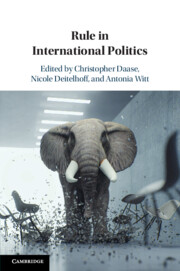Book contents
- Rule in International Politics
- Rule in International Politics
- Copyright page
- Contents
- Contributors
- Acknowledgements
- Introduction
- Part I Theorizing Rule
- Part II Practicing Rule
- Part III Resisting Rule
- 8 Exploring Relations of Rule and Resistance in Global Politics
- 9 The Contested Authority and Legitimacy of International Law
- 10 Rule and Resistance in the Anti-globalization Era
- Index
- References
10 - Rule and Resistance in the Anti-globalization Era
from Part III - Resisting Rule
Published online by Cambridge University Press: 15 June 2023
- Rule in International Politics
- Rule in International Politics
- Copyright page
- Contents
- Contributors
- Acknowledgements
- Introduction
- Part I Theorizing Rule
- Part II Practicing Rule
- Part III Resisting Rule
- 8 Exploring Relations of Rule and Resistance in Global Politics
- 9 The Contested Authority and Legitimacy of International Law
- 10 Rule and Resistance in the Anti-globalization Era
- Index
- References
Summary
Anti-globalist leaders form a distinct set of challengers to the global system because they share a common motivation: the desire to regain national sovereignty and reduce the power of international institutions. This chapter considers three different forms of anti-globalist resistance: (1) attempts to dismantle status quo regimes through unilateral action that challenges existing rules; (2) joining coalitions across states to transform existing multilateral institutions and reduce rules or obligations; (3) building new institutions or seeking alternative venues that favor state sovereignty over interconnectedness. Each strategy could transform the content of international rules, but with different implications for how we understand the nature of institutional authority. If international authority has moved beyond state consent and international institutions themselves now constitute a legitimate source of authority, anti-globalist leaders will find it difficult to escape the confines of institutional commitments through unilateral action. For strategic anti-globalists, then, the optimal way to undermine cooperation may be to work within the system itself, shaking the foundations of the post-1945 international order.
Keywords
- Type
- Chapter
- Information
- Rule in International Politics , pp. 242 - 268Publisher: Cambridge University PressPrint publication year: 2023



